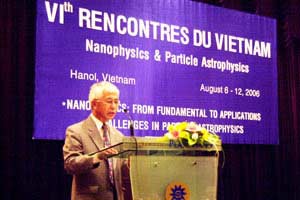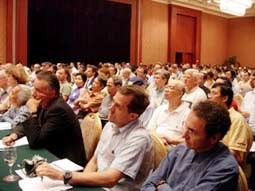'Meeting Vietnam' Opening

Prof. Tran Thanh Van during the opening ceremony.(Photo: ND)
On the morning of August 7, the sixth ' Vietnam Meetings ' Conference with the participation of 225 international physicists (including two Nobel laureates) and 100 Vietnamese physicists opened At Hanoi. We had a quick interview with some Vietnamese scientists who organized this international physics conference.
* Prof. Tran Thanh Van (University of Paris, France):
Need to rejuvenate the local GS team
- Could you please briefly introduce about the characteristics of the 6th 'Vietnam Meetings' conference?
In the sixth ' Meeting Vietnam ' conference, we focused on applied physics in life with two main issues that are challenges in astrophysics and nano physics: from basic to applied use. Although the meetings before this topic are also mentioned, it is unclear.
This year, there were a lot of young nano physicists from Vietnam. It is a good signal for the future of the country. In 10 or 20 years, these young scientists will replace current scientists. We set expectations for this young scientist class. Therefore, we organized classes before and after the conference so that they could understand what was mentioned in this conference.
 Scientists at the 'Meeting Vietnam' physics conference. (Photo: ND)
Scientists at the 'Meeting Vietnam' physics conference. (Photo: ND)
- In addition to nano physics, the content of this conference also refers to astrophysics physics. Is this far from Vietnam, GS?
- In Vietnam, as we know, astronomy is not taught in high school, so when studying abroad, many of our students do not have any knowledge about this field. Therefore, our desire is to train a class of overseas astronomical cadres to bring to Vietnam to teach astronomy at domestic universities.
- During the conference, did you have any suggestions with the Vietnamese government to develop the domestic physical science?
- The standard to become a GS in Vietnam is slightly different from that of foreign countries. In France, 70% of GSs are under 40-45 years old. Meanwhile in Vietnam, the number of GS under 45 years old accounts for only 1%. What I look forward to most is the standard of GS in Vietnam which is more and more flexible, creating opportunities for young scientists after being trained abroad to work in the country will have a place to help them promote your ability.
* Prof. Dr. Nguyen Van Hieu (University of Technology, Hanoi National University):
Nano physics - the opportunity to develop home physics
- Dear GS, what do you think about the direction of developing nano physics applications in Vietnam?
 German scientist - Klaus von Klitzing (Photo: klaus-von-klitzing-preis)
German scientist - Klaus von Klitzing (Photo: klaus-von-klitzing-preis)
- Currently, scientists, especially Vietnamese scientists, are eager to enter nano physics, because this field has two obvious advantages. Firstly, it is a very modern science field in the world, going into this field, it is easy to get high-value scientific works. Besides, the important thing is that nano physics is attached to the development of the country, so entering this field can contribute directly to the country's science, so they are very enthusiastic. I think this is the only opportunity for home physics, since so far, the physics research industry is often considered to be far away from life, this is the first time the physics industry has come to address the needs. reality of the people but on the basis of very high scientific qualifications.
- Opportunities of young Vietnamese scientists when participating in the Conference this time, GS?
- We hold this conference for two purposes. The first purpose is to invite famous scientists from the world to introduce directly to young Vietnamese scientists about the work they are doing. Secondly, thereby enabling Vietnamese young scientists to directly interact with scientists and establish their own partnerships. According to previous experiences, after each conference, many foreign scientists have found excellent students in Vietnam and sought international scholarships to bring them abroad to work. I think after this nano conference, Vietnamese young scientists will have many opportunities to go abroad to work and study.
* Prof. Pham Quang Hung (Virginia University, USA):
About 10 years from now, Vietnamese science will develop
- This is the second time that GS returned to Vietnam to attend the Meeting of Vietnam, and this time as a member of the organizing committee, what do GS think about the future of Vietnamese science?
I think Vietnam should continue to pursue the current development strategy. I see the progress very clearly and probably within 10 years or maybe sooner, Vietnamese science will develop very strongly. The most important point is that Vietnam needs to invest n

Prof. Pham Quang Hung.
(Photo: ND)
More in the field of science to make more and more Vietnamese students go abroad to study, as well as funding Vietnamese physicists to go abroad to attend international physics conferences. I just came back from Beijing and met a Chinese astrophysicist who was eager to exchange experiences with Vietnamese physicists. Since then, I have an idea that will bridge the encounters between the two scientists in the future.
- What is the model like this conference according to GS?
- In my opinion, this is an opportunity for overseas Vietnamese professors to come to Vietnam to witness the development of Vietnam, so they know what Vietnamese science really needs to have practical help. For example, they can help Vietnamese students go abroad to study and study. A short three-month study trip also helped local scientists better access advanced science. On the other hand, overseas Vietnamese professors return home to teach every few years. A program that I found very interesting is the winter physics school of Dr. Nguyen Anh Ky held at the end of the year. Dr. Ky invited foreign professors and Vietnamese overseas Vietnamese to come to Vietnam to teach young researchers with postgraduate degrees in Vietnam and some Asian countries.
- Dear Professor, after two years from the day you participated in the report at the 5th Vietnam Meeting, did you have any new research projects?
- I am studying dark energy, now this topic is being studied by many scientists, and so am I. I have reported on this topic at many international physics conferences. But this time I returned to Vietnam as a member of the organizing committee so I did not present the report but only invited international scientists to present their research.
I have two students participating in dark energy, a Chinese student and an American, I am hoping to find some Vietnamese student who can afford to study this topic.
- Thank you Professors!
HONG VAN performed
- A series of memorable opening ceremonies of 7x and 8x generations
- Opening the international scientific conference on physics in Quy Nhon
- Vietnam attended the 54th WIPO General Meeting
- Building museums, cosmopolitan houses, creating international scientific meeting points
- New international science meeting place in Vietnam
- Precious photos of the opening ceremony in the 1960s and 70s
- Opening of Vietnam Creative Day 2006
- Opening of USOL Software Development Center Vietnam
- Opening Robocon Vietnam Final 2007
- Opening of a large exhibition of machinery and technology in Hanoi
- Smart robots replace meeting people
- Rare picture of life in rural Vietnam in 1993 (Part 2)
 Vietnam 5th Asian champion on fuel-efficient vehicles
Vietnam 5th Asian champion on fuel-efficient vehicles We can read all NASA studies completely free of charge
We can read all NASA studies completely free of charge Singer and songwriter Bob Dylan won the 2016 Nobel Prize for Literature
Singer and songwriter Bob Dylan won the 2016 Nobel Prize for Literature Scientific revolution in Asia
Scientific revolution in Asia